#Promotional gifts in Palestine
Text
HOW TO HELP:
A list of organisations working to aid communities around the world suffering humanitarian emergencies.
MSF provide urgent medical and surgical care in conflict and crisis zones, providing treatment to anyone who needs it, regardless of political affiliation or what side of a conflict they’re on.
The World Food Programme provides urgent food packages to communities that are most at risk of food insecurity, in places like Sudan, Ethiopia, Afghanistan, the Congo, Ukraine, Palestine, Syria, Yemen, and many more.
https://www.rescue.org/uk?_gl=1*1pjpb2g*_ga*MTA0MjAyNTQ0MC4xNzA3OTE3NTA1*_ga_2VX3X7JYPY*MTcwNzkxNzUwNS4xLjEuMTcwNzkxODMwMS4wLjAuMA..*_ga_DDZCWB8N2Y*MTcwNzkxNzUwNS4xLjEuMTcwNzkxODMwMS40Ny4wLjA.
The International Rescue Committee provides vital aid to people living in conflict zones, such as Ukraine, Gaza, and Sudan.
Action Aid supports women and girls around the world who are most at risk of deprivation and poverty, sexual violence and FGM. They also provide menstrual products in areas where it is almost impossible to find the most basic levels of hygiene and sanitation, such as conflict zones.
Beyond Conflict is a mental health charity working with survivors of war, with a focus on children, and are currently funding projects to help both Israelis affected by the Hamas pogrom in October and Palestinians affected by the ongoing war.
Refugees International works with refugees and displaced people around the world.
233 notes
·
View notes
Text
In honor of Women's History Month and International Women's Day, I would like to dedicate a post to ways we can help women around the world facing genocide and gender based violence. Below are a list of organizations and groups to donate to focused on bettering the lives of and providing direct aid to women and girls in areas of conflict. This is an evolving list/resource so I will gladly take suggestions or edit requests from anyone who knows of a verified group helping women and girls that could be added to this list.
Access to Menstrual Products and Repro Healthcare
Sudan, Palestine, DRCongo, Lebanon
Sudan
Periods don’t stop for war: For every $5 Donated a woman or girl in Sudan receives a menstrual hygiene kit for the month
Let's Talk Period: As disposable menstrual hygiene products are too expensive for most women, grassroots groups have popped up to make, distribute, and educate other women and girls on how to make their own reusable pads.
Sudan Charity Navigator: A list of charities including Doctors Without Borders and food assistance groups providing aid to Sudan
Darfur Women Action Group: DWAG advocates for the protection of civilians, promotes women’s leadership, provides elementary education for children in refugee camps, and provides trauma counseling for survivors of sexual violence
Amal for Women: Amal For Women was able to help people in Al-Jazeera state, Darfur and refugees in Egypt. GoFundMe/PayPal doesn’t release the funds raised until the 25th of March. Please consider donating to reach more people the rest of Ramadan and Eid. Other donation links and more info here
Palestine
Pious Projects: "At $20 each, this kit will include - but is not limited to - sanitary pads, a hair brush, tooth brush, toothpaste, cotton swabs, wipes, tissues, and other hygienic items depending on availability. Distributions will take place in various areas accessible to on-ground teams such as camps in Rafah and UN schools."
Anera: there’s a list of things certain amounts of money can get the people of Palestine, $10 can get a family a blanket for winter, $40 can provide hygiene kits that include menstrual products, and $75+ can get people a mattress and more
Arab.Org: Free daily clicks generate ad revenue that goes to UNRWA. This link in particular shows you a full list of specific projects in need of funds you can also give to with a click from poverty to the environment to a fund focused on women.
DRCongo
City of Joy: “The City of Joy is a transformational leadership community for women survivors of violence, located in Bukavu, Eastern Democratic Republic of Congo (DRC). Conceived, owned, and run by local Congolese, the City of Joy has flourished since it first opened its doors in June 2011, healing women from their past trauma through therapy and life skills programming while providing them with the essential ingredients needed to move forward in life – love and community.”
Panzi Foundation: “Every day, between 5 and 7 new survivors walk through our doors. For 20 years, we’ve not only mended each woman’s injuries, we’ve walked with them to healing—every step of the way.”
Lebanon
Global Giving | Days for Girls Lebanon: Health education and locally made washable menstrual kits to women and girls since 2011
Products for Babies and Children
Palestine, Yemen, Sudan, DRCongo
Palestine
Care For Gaza: The work Care For Gaza does is all-encompassing by necessity. From food to money packages to winter clothes to diapers for babies and disabled or elderly adults, Care For Gaza is an on the ground group providing direct aid to Gazans.
Yemen
Go Fund Me: Food Packs and Eid Gifts for the People of Yemen
Sudan
Human Appeal | Sudan Emergency Appeal: Funds orphanages, food, and baby formula
DRCongo
War Child: Tiered donations can provide children with school books, meals, and toys
~~~~~~~~~~~~~~~~~~~~~~~~~~~~~~~~~~~~~~~~~~~~~~~~~~~~~~~~
This is an evolving list/resource so I will gladly take suggestions or edit requests from anyone who knows of a verified group helping women and girls that could be added to this list.
#keep eyes on sudan#liberate sudan#free palestine#reproductive health#reproductive rights#menstrual health#period poverty#international women's day
21 notes
·
View notes
Text
Monthly Roundup October 2023

"All eligible donations are now being matched by the government of Canada.
Gaza is home to more than 2 million people, and half of them are children. Since October 7th, over one million people have been forced to leave their homes to escape the fighting. But nowhere is safe. Food, water, fuel and medical supplies are all running out and access to these resources are severely restricted. Tens of thousands have been injured and the medical system is on the brink of collapse.
Our member agencies are well-established in Gaza and the West Bank and are operating as best as they can, distributing pre-positioned stocks of food, water, and health kits. But these supplies are running out too.
Your gift will ensure that once safe humanitarian access is restored, we can scale up our response swiftly and effectively to deliver food, water, shelter, medical care, and protection to those who need it most. Together, we can save more lives."
Donate today HERE
Canada demand an immediate ceasefire in the Israel-Palestine conflict;
Canada ask that Israel lift the blockade of the Gaza Strip and authorize the creation of a humanitarian corridor and an emergency humanitarian intervention;
Canada ask that Israel meet its commitments under the Geneva Conventions and international humanitarian law;
Canada meet its international commitment to promote and defend human rights;
Canada take any other measure necessary to protect civilians, both Israelis and Palestinians, and help foster a climate conducive to building a lasting peace.
Sign the Petition HERE
Follow On Canada Project on Instagram HERE for further information on actions you may take.
Gaza Needs A Ceasefire, Now
Sign the Change.Org Petition HERE
6 ways you can support Palestinians in Gaza
Teaching About the Israel-Hamas War
A collection of resources to help students learn about Hamas’s recent attack on Israel, the dire situation in Gaza, the conflict’s roots, media literacy and more.
______________________________________________________________
New $2M gift bolsters Dallaire Institute’s work to end recruitment of child soldiers
"The Fondation Monbourquette has made a $2-million gift to the Dallaire Institute for Children, Peace and Security that will support the institute in initiating sustainable and effective approaches to global peace and security. Specifically, it will strengthen the institute’s efforts to end the recruitment and use of children in armed conflict and violence and break the cycles of violence."

'Beasts of No Nation' Author on Child Soldiers in War
"Beasts of No Nation" author Uzo Iweala joins Lunch Break With Tanya Rivero to discuss the book's unique look at child soldiers in war and its milestone status as the first fictional feature distributed by Netflix.
#monthlyroundup#ceasefirenow#stopthegenocide#civiliansarenottargets#donate#HumanitarianCoalition#OnCanadaProject#UNICEF#humanrights#Canada#Gaza#Palestine#Israel#DallaireInstitute#DalhousieUniversity#ChildrenNotSoldiers#ActToProtect#reintegration#rehabilitation#reconciliation#Africa#peace#youth#BeastsofNoNation
3 notes
·
View notes
Note
Hope you are well! I enjoy your thoughtful replies so I wanted to add to the chat because I’m a fashion lover and I enjoy royal watching. Beware, this is a long post 🫠
I want to comment on the Queen’s fashion change, On her latest appearances, she has been wearing the French fashion house Lanvin who is now owned by a Chinese holding company. As we know China supports Palestine.
Before the war, she usually wore LVMH owned luxury brands like Dior, Berluti , Loewe, Fendi, Givenchy, LV. If you follow influencers you will notice Rania is always wearing the same bags that they get as PR gifts, which lead me to assume the Queen receives them as PR gifts and might be considered as a high-profile unofficial ambassador for their brands. An example of this is Rania wearing the Yayoi Kusama Collab at the same time than Chiara Ferragni.
LVMH is owned by the Arnault family… Iman wore Dior for her Big Day, Rania wore Dior for Hussein’s wedding and Rania wore Givenchy Rajwa’s ladies ceremony (this iwas told by someone that attended that ceremony but I have not seen a picture).
Iman’s wedding band is Tiffany which is also owned by them and Jameel wore a pair of Berulti shoes for the televised ceremony. Remember Iman’s beautiful tiara? Is made by Chaumet… they get a lot of freebies I think.
The Arnaults were invited to both Hussein and Iman’s wedding and I mean the real-real wedding that lasted days, this is not gossip but from stories posted on the the Arnaults public Instagram accounts. Now, GUESS WHAT!? The Arnaults have shown support for Israel… so now the Queen has publicly distanced from them in a fashionably yet subtle way and lost one of the biggest wardrobe sponsors because of course, she is getting all those goodies for free.
Hope you and your followers find my rant interesting. I have one about why I think Rajwa’s royal closet and wedding attire being bought from Hussein’s private money. 😆
Have a great day!
Hellooo
Yesterday Dior replaced Bella Hadid by an Israeli model. That was disgusting! The west was always lecturing us on freedom of speech and bla bla blaaaaa yet look what they've done for Bella for Expressing herself.
Am sure now !! We'll never see Rania or her daughter/ Rajwa in Dior again at least publicly. I hated it that Q Rania and K Abdullah were friends with so many zionists like Joe Biden ( he said it himself looong ago ) for example , they could have maintained the formal relationship of two Head of states YET they were close and they invited Jill Biden to Hussein's wedding. But the worst part of it was inviting Ivanka Trump.
I don't think Queen Rania gets freebies, she doesn't need any of it. Maybe some items were offered to her and that's it. But I believe she pays for her clothes. Did you get this info from the statement she released years ago ? Iman also wears designer clothes and she's barely seen in public ( does she get them for free to be an embassador to the brand too when she's not seen in public so often ? ) same with Salma. Princess Ghida too, wears expensive clothes, so do so many Jordanian princesses! Samiha el Fayez too! That's how they live , they're so rich. And Abdullah is the richest one amongst them. Honestly I don't by that narrative of freebies that she stated. For sure she get gifts from time to time or she helps promote local and Arab brands but that's it! Do you have any screenshots of the stories shared from the private ceremony of Hussein's wedding.
Yes your rant is really interesting thankk youu 🥰
4 notes
·
View notes
Text
Reading the Bible with the Church Fathers
St. John Chrysostom and Origen
Antiochene (literal) vs Alexandrian (allegorical)
Genesis 1:1-3:19
By: Alphacenturion
Background
Chrysostom, lived between 314 and 407 AD, and among many other works he wrote about 76 homilies on genesis. he was a preacher in Antioch and in Constantinople he stands high in the tradition of Antioch looking for a more literal, “by the letter,” interpretation of the bible. His is an exegetical tradition. He preaches and promotes good works such as attending church Bible study and giving alms, and the avoidance of evil deeds such as gambling, being lazy, sloth, and watching horse races. The only time he allows for a spiritual or allegorical sense of the interpretation is when that interpretation is in support of, or supported by, the New Testament especially the writings of Paul.
Origen was born around 185 AD most likely in, or around, Alexandria, though that is disputed by his detractors, his father was a known martyr. Origen himself is a bright light and immense structure of the early church as his works and accomplishments are myriad, he is considered by many to be the first theologian and the first to use reason as a methodology for examining the Bible and biblical texts, at least the first Christian to examine the Bible in this way. A dean and major figure of the Alexandrian School, which was founded by St Mark the Evangelist (the Apostle and Author of the Gospel of Mark), the school didn’t find fame until 190, Origen didn’t become dean of the School until 203 AD. Origen examined the Bible from a Spiritual or what we might now call an allegorical point of view. His most famous work is titled On First Principles. He is spoken highly of by other major Christian figures such as Eusebius. But for all of his accomplishments and his many admirers in the early church he had vocal enemies and powerful detractors such as Demetrius the bishop of Alexandria. Who's slander against Origen persist to this very day in many prominent Protestant and Calvinist circles. Origen was a well-read classicalist for his time, and he enjoyed studying the Bible, first in the Greek then later in the Hebrew, it is his fondness for the Hebrew which will begin to get him in trouble with the orthodox of his day, around 215, Origen visited Rome, a See that still appreciates his gifts to Christian Theology to this day, he was well traveled for that time period and even toured throughout Palestine. His death is disputed, he either died in ignominy, in 255 having unfortunately survived horrible torture, or he died as a martyr in 250 during the persecution of Decius. If you think Origen should be considered a church father, then you are more likely to think that he was a martyr and thus went to heaven; if on the other hand you think he was a heretic you are more likely to think he died having been denied martyrdom.
First let’s look at St. Chrysostom’s literal interpretation of Genesis 1-3.
He begins by an exhortation to temperance, obedience, and moderation which will lead to Wellness; while he warns that indulgence, intemperance and mildness lead to illness and death. For Chrysostom, if overindulgence is the cause of the problem, then fasting and avoidance is the cure and corrective. He is a proponent of self-denial. He then warns that one should not compete in fasting or temperance nor even in moderation; one must not go to excess or excesses in being temperate; one must demonstrate self-control even in self-denial.
He then looks at Romans 2:13 and quotes that: “It is not hearers of the law whom are just before God, but the doers of the law shall be justified.” Then Chrysostom adds a quote from Amos 6:3 “You who put far away in your mind the day of coming disaster, woe to you that sleep upon beds of ivory and are wanton on your couches: that eat the lambs out of their flock, and the calves out of the midst of their herd; you who sing songs idlily from the Psalter; you that think themselves to have instruments for music like David; you who drink wine in bowls, and anoint themselves with the best of ointments; but yet are not concerned for the affliction of Joseph! Wherefore now shall they go for you will be the first to be held captive, led at the head of the exiles, of those who go into captivity: and that faction, the revilers, the luxurious ones shall be taken away.”
After this grim warning, Chrysostom affirms Biblical inspiration, that the word of God truly spoke through the inspired authors, though it was written many generations after the events portrayed or relayed had occurred. Chrysostom takes pains to downplay the abilities of human reasoning, and then takes a moment to talk down to Jewish people for being stubborn in their doubt and questioning. Reminding the Jewish of his audience, as relates to the Hebrew Bible, that it is “God who makes and transforms all things and refashions all things according to his will.”
He bases his teachings about spiritual things on visible realities. That while we are to be guided by the spirit in our teaching and sharing the good news, we are to do so by faith within our limitations and not try to grasp higher than our reach. He advises that we should, and explains that he does, adapt the Message of the Good News to different audiences, based on their needs and comprehension abilities, that your methods, means, and wording of the message must be adapted to who you are speaking in front of or writing to. This for him is especially true when dealing with the Old Testament and even more so when working through Genesis.
Chrysostom, in example, speaks of two passages here. He compares Genesis 1:1-5 with John 1:1-5; but he also makes many inferences and implications that he does not expound on, nor explain in any detail for the rest of these set of Homilies. For instance: What he meant by authorship? Or, What he means by the separation of light and darkness. These are just two examples of where Chrysostom’s principles of interpretation can be applied aptly, but he merely teases out the inference and doesn’t delve into deeper meaning. This is a limitation of his Antiochian approach.
For instance, on authorship he implied that even given the objections Moses being the literal author one could reason to, and remember he is writing circa the 300’s, he claims that it is still correct to call Moses the blessed, or the inspired, author of genesis. His explanation runs something like this, to put it in semi-modern terms. It is right to call “Moses” the author of Genesis just as it is right to call Mark Twain the author of Tom Sawyer, or Shakespeare the author of the plays attributed to him, or Homer the author of the Iliad and the odyssey. The next reasoned to objection, he also dismisses, that even if a myriad of authors penned the work, even if great authors wrote a series together but they did so under one pen name, it would still be correct to give credit of authorship to that penname. As we know what we are getting and what to expect when we pick up that pen name. We, the audience know and trust that pen name and understand the style and conventions we are to expect if we read something by say Anne Rice or by A.N. Roqueluare. To put a finer point on it, we, the consuming audience, are not reading Samuel Clements we are reading Mark Twain and we know the difference.
So too with Moses. Moses is the tongue, Moses is the pen, Moses is the instrument God uses through inspiration to tell his story. In the story of Genesis, Moses is the storyteller. That is his role for us the listener and the reader. Does that mean that Moses was the first to tell the story or that he was its only contributor? No more than Homer was to the Iliad but when we read the Iliad, we read we hear Homer. When we read Moses, we know who and when he represents. That attribution may have come later than the first recitation of the story, but that does not change the authorship for us, nor does it alter the inspiration. In this case the Holy Spirit inspired blessed Moses, whomever blessed Moses was or was not.
The first four homilies of Saint John Chrysostom’s apology on Genesis can be broken up into seven points and span the first four days of creation. The seven themes are as follow:
Day one
1. God is the creator of all things.
2. God is a God of order
Day two
3. God is a God of authority and obedience.
4. God is a God of goodness
Day three
5. God is a God of unity.
6. God is a God of beauty.
Day four
7. All things have their use and purposes. Lights are there to guide and divide. Vegetation, growth, and fruits even those things that are harmful, inedible, or poisonous are that way for a reason.
Chrysostom then comes to some conclusions about the message of the story so far. For him, the first two accounts in Genesis are teaching that there is one heaven; one earth; one reality. And thus, there is only One God, and only One truth. But again, he doesn’t expound beyond his own limitations of interpretation, nor does he go beyond the perceived limitation of the text into speculation.
Instead, he takes this opportunity, in raising and then dismissing the obvious questions and objections, to promote daily study and prayer as exercise for the mind and soul. That rigor and discipline in good habits and good works will produce good fruit. Chrysostom also takes time to demonstrate in his writing an appreciation for Saint Paul. Something many of his readers and commentators take note of. To make sense of his Homilies on Genesis, it is important to make a mental note that he is preaching to a domestic church, during the season of Lent, and that he is actively encouraging them to participate in small group, daily Bible study, and that in these small groups they ought to converse on the divine, and on biblical topics; that is instead of gossiping, gambling, gaming, or indulging in other temptations.
He then finally gets to the body of the text, but first he complements the precision and considerateness of the Blessed Author, as he says that he teaches through the telling of the creation of Adam that the body comes first and then ensoulment. But at this point we come to homily 15 and we get to the first major textual corruption, so the rest of this homily is a paraphrase of what is missing from his lecture.
Ironically his next encouragement is to say that with the Christian, correct doctrine is of no benefit unless one attends to the business of living. Therefore, blessed is the one who both does and teaches. He then quotes Matthew 5:19. Followed by an exhortation to “let us not stop short at the literal level; instead, let us reason from the perceivable visible realities to the superiority of spiritual realities.” And here again, Chrysostom complements the precision and considerateness of the text and author. He explains again that the biblical text, especially Genesis, is written with the limitations of its audience in mind. He explains that the words used by the text are precise: that to will, direct, and command are each different things, just as to form and shape are different modes of operation, as is the words formed versus fashioned. Each saying something different about how God approaches the creation of different creatures and beings.
After plenty of base level commentary, which can be found in most study bibles or on most apologetic YouTube channels that speak about Genesis the next big topic Chrysostom takes on in his Homilies is the Fall, and here he says something I had not heard elsewhere before, he claims that the snake in the garden was not the devil but that the snake was used by the devil, and that this is evidenced by the devil's words and the fact that snakes don’t talk. That the devil worked through the serpent, but by being a tool for the devil the serpent was still punished, and that we, mortal humans, shall trample upon are the serpents and scorpions of/in our minds. Considering that I had just read a little over a hundred pages extolling the benefits of a literal interpretation I was almost shocked that Chrysostom went for a more spiritual metaphysical interpretation here. That the snakes and scorpions mentioned in Genesis are the temptations and doubts that live in our mind.
The tree of the knowledge of good and evil also gets an allegorical treatment here, though to a much lesser degree, the forbidden tree is that of carnal knowledge, it is the divide between the theoretical knowledge of evil and the act of evil, it is highlighting the difference between and is the embodiment of theoretical knowledge and practical experience, between potential and actual. The eating of the fruit is knowing the difference by experiencing it, the act of knowing versus simply understanding, going back to Chrysostom warning about the limitations of Human Reason. Knowing is different than doing, doing is a deeper level of knowing. It is knowing in a true sense.
In this vein Chrysostom continues. The concept that “God strolled in the evening” is equivalent to the conscious which knows all but still asks. Adam trying to hide from God is equivalent to shame. To be denuded and aware of one’s own nakedness is equivalent to being stripped of God's good glory.
The reason for this departure from a literal simple reading of the plain text is that Genesis if read absolutely literal pushes against the understanding of God from Psalms and the New Testament. An anthropomorphic God is not compatible with the simplistic (unchanging), all knowing, all powerful, timeless, eternal, monotheistic, Trinitarian God of the Gospels, Acts, Epistles, and Revelation. Hence the limitation of the Antiochian School, Protestantism, Ultra-literalism, and Sola Scriptura.
Now, for contrast, let us look at Origen and how he understands Genesis 1:1-29.
For Origen, the heaven being spoken of in Genesis one is incorporeal, which is consistent with later Biblical text which states that God's throne comes before the world. Therefore, Genesis and the verse in the beginning is not and cannot be speaking of temporal beginning nor is Genesis meant to be taken in a chronological manner or temporal sense.
Like Chrysostom, Origen finds many of the same themes in the opening seven lines of the Bible. For both men, and therefore for both schools, Genesis and the Bible as a whole teaches that God creates, God orders, God brings light from/to darkness. God brings order from/to chaos. For Origen though, the abyss referenced in Genesis is the same as the abode of the devil and the demons. For Origen, he sees direct references to the dragon and his angels in the warnings and ongoings of Genesis. In Origen’s recounting of the Genesis account, God dissolved the darkness, and it was God who names all things before the invention of language.
This can be and is true, because all this takes place before the existence of time. And time, for Origen, is older than this world. You may at this point be excused for thinking mistakenly that this Alexandrian method of interpretation is more literal and fundamental than the Antiochian, but you would be wrong on at least one of those counts. For then Origen explains that the firmament here and the heaven made in the second account is corporal; for him, the division is between earth and heaven, between body and soul. The heaven of the mind. The earth of the body. Darkness is chaos, which is to say lack of reason, lack of consciousness, lack of self-awareness. Light is order, reason, thought, and consciousness. Genesis 1-8 is the story of humanity reaching consciousness, both collective and individual.
Origen’s next big claim is that the world created in genesis came into being before time existed. For all the fun this concept and idea can generate it does lead to some questions, for instance, What does this represent? What is the water above heaven? What are the waters below heaven? Is darkness equivalent to the abyss, is the abyss equivalent to hell?
Origen implies that Heaven and spirit is equivalent to mind, and that mind is equivalent to self. That Heaven is the internal (eternal) self, and that Earth is the external (temporal) self. The firmament is the barrier between your existential metaphysical self and your practical physical body. Christ and the church are the sun and the moon for the believing Christian, he goes on, that just as a blind man cannot see or make sense of the light radiating from the sun so to the spiritually blind cannot make sense or understand the light radiating from Christ. The Birds are equivalent to high thoughts, while crawling things are equivalent to low thoughts. The firmament Divides the spiritual from the carnal.
Origen’s theory, his interpretation of genesis is that it is speaking of the spiritual creation and that genesis 2:5 is speaking of carnal creation. Origen is an interesting and intriguing read. While, his approach does circumvent the current literacy development hypothesis, Origen does have a proof. In Genesis one, man is formed (from dust in later parts of Genesis), while in Genesis two, man is shaped from slime. Genesis one, being the form or spirit of all things. Man being in the likeness of God, bears special significance for Origen. Earth, sun, and moon are created by God. Everything else is created by God’s command. There is present in the interpretation some fine distinctions between words, but I cannot deny that his approach is compelling.
Origen’s views on Humans is also different than Chrysostom’s. For Origen, Male and female are stewards of the earth, the animals, and the vegetation. They, Male and Female, are equal in dignity. Yes, the Male first, then female second, in authority; but that authority is over all creation. This order shows sovereignty of God over beast, earth, rock, and human alike. Ocean or fish; air or bird, God has sovereignty over all. In Origen’s take on the events of the fall, animals suffer due to our fault, due to our flaw the whole of creation suffers. Our power then is in our care for the welfare of the planet, it's resources, and it's life that lives on in it, including each other and ourselves. As the text says, We “are like gods” but we are like gods, lowercase g, in our dominion over the earth and it's creatures. We are made in both the image in likeness of God.
Form and Dominion, spirit and creation; through reason, we as humans, can dominate even lions and sharks. The text shows this dominion in our naming things. It should be noted that in these older Early Church Father Homilies you will find the Woman named Zoe and not Eve as we are accustomed too. A common misunderstanding about Zoe and the serpent, as some might explain it, was that Zoe was the weak willed one, the cause of our fall; but for Origen and the Alexandrian school this could not be further from the Truth. She is as much human as Adam, Zoe is as much human and free as you or I. Evidence for this is in the text of Genesis itself. For the woman has a conversation with the snake, the woman's stands her ground against the snake, accuses it of its own faults without hesitation. In Origen’s telling of it, she could have chosen not to take its advice. The snake was scared of her, but she was not scared of it. Again, he highlights that she conversed comfortably with it. She did not take flight. She was not terrified by its appearance.
Here we get Origen’s understanding of Sin. For him, and presumably for his school, sin is the loss of both esteem and authority together. That we should not be shocked by this, nor should we be resentful of the punishment, nor think it unjust as we are fellow slaves of God as are the animals. Animals and beast, crops and wild jungles, and untamed forest, all serve and aid us in our daily lives even though they suffer for our mistakes and our cruelty.
Here Origen reminds us of the Biblical precept that “Not sacrifice of animals but contrite spirit and a humble heart is what God desires.”
For Origen, the co-creation accounts are a summary of what we would call evolution: but for him it documents more than just physical development, but it documents spiritual adaption and mutation as well. Life adapts to its environment and the environment adapts to the life that is living on it. Habitation is more than just mere survival. The land, seas, rivers, and waters all change and adapt, life in temporal caporal reality changes. But in the spiritual realm there is no change only the eternal.
Here Origen iterates the same philosophical warning as Chrysostom, everything in moderation. The goal here seems to be excellence of some sort, human or divine is unclear at this point of his homily. For Origen, excellence is equivalent to perfection, and perfection is equivalent to the good. If all created things are constantly changing, then excellence must be reached in the spiritual realm. Life is affected by all that is around and interacting with it. Gravity, wind, pressure, and time, to heal and grow are all necessary, but do not fear for all is guided and/or permitted by God's will. For Origen, it is our ability to acclimatize and actualize that is the evidence of design, and then he gets very near to Chrysostom and says that this precision and considerateness is proof of God’s good will toward us. I would like to note here that you may be tempted to contrast and criticize Chrysostom’s apparent anti-Semitism and misogyny against Origen’s perceived environmentalism and egalitarianism; but this would be an anachronistic mistake as these political and social concepts did not exist during the periods that these men were writing. The same accusation and contrast is made by many, modern, would-be, theologians when it comes to St. Peter and St. Paul, but again this perceived difference is anachronistic to the lives, thinking, and times of these men.
Sources:
St. Chrysostom, John. The Fathers of the Church vol 74 Saint John Chrysostom Homilies on Genesis 1-17. Translated by Robert C. Hill, Published by The Catholic University of America Press. 1986, 1999.
Origen. The Fathers of the Church vol 71 Origen Homilies on Genesis and Exodus. Translated by Ronald E. Heine, Published by The Catholic University of America Press. 1982, 2002. pp. 1-71.
8 notes
·
View notes
Text
Shri Venkateshwara University aims to promote Indian education and culture worldwide through a collaborative educational agreement.


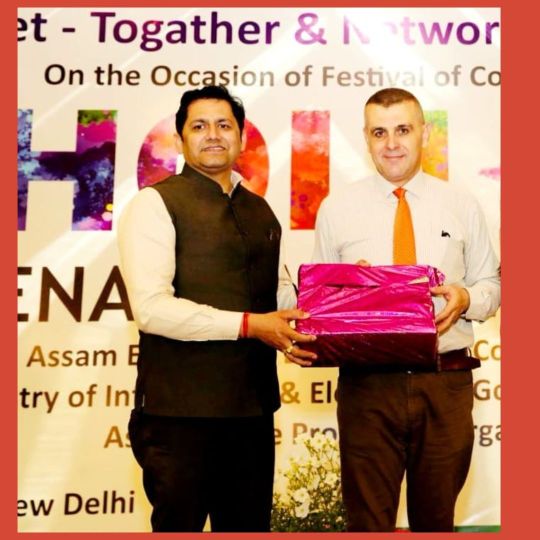

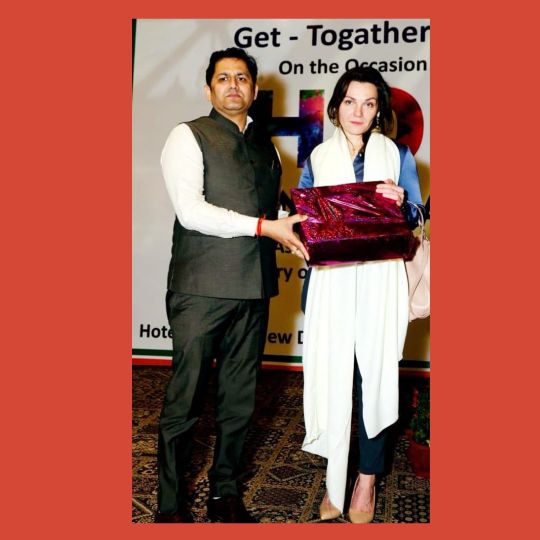



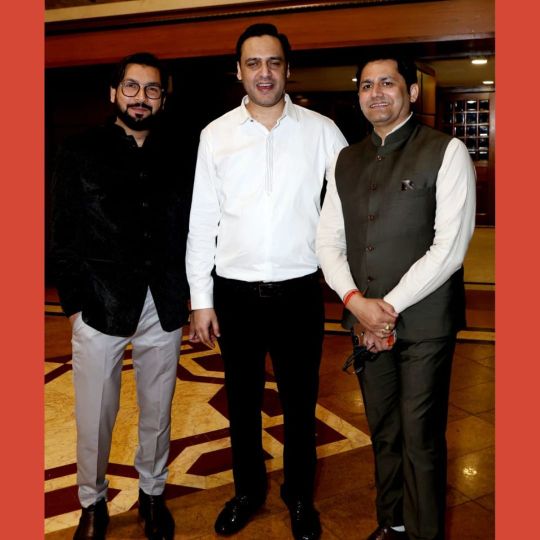








Shri Venkateshwara University/Institute agreed to a shared educational contract with many countries to propagate Indian education & culture all over the world.
Shri Venkateshwara University, along with Zeenat Handicraft Ltd. & IT Ministry Government of Assam, organized a shared educational contract cum Holi Celebration function at Ashoka Hotel in Delhi.
Ambassadors and High Commissioners from over 40 countries, including the UK, USA, Palestine, Brazil, Russia, Canada, Austria, Zimbabwe, Kenya, and Dubai, took part in a shared educational contract and Holi Celebration function.
The Pro Chancellor Dr Rajeev Tyagi, who is the official representative of the Founder President Dr Sudhir Giri along with the Director of ZH Mr Kashif, felicitated the diplomats by gifting them turban, Patka & a memento.
Mr. Bhubaneswar Kalitha, Rajya Sabha MP, & Chairman of the Health Ministry Standing Committee was the Chief Guest at the event.
From June onwards, Shri Venkateshwara University will start a shared educational programme with the UK, USA, Palestine, Brazil, Russia, Canada, Austria, Zimbabwe, Kenya and a dozen countries.
Student exchange & Faculty exchange programmes will be the main outcome of this shared educational programme.
On this occasion, we honored Palestinian Ambassador Besam F Harris, Russian High commissioner Oksana Agefonova, Slobodan Ozonov of North Macedonia, Jalata Antuseva of Kazakhstan, Angelo Matikyoko of Brazil, along with over 50 high commissioners from different countries.
The Venkateshwara Group Founder President Dr Sudhir Giri reiterated Holi is not only a festival of colours, but a symbol of enthusiasm, love, joy, harmony & national unity.
The CG, Mr. Bhubaneswar Kalitha, asserted Indian culture unifies the entire world, Holi is not just a festival, but the art of living life with harmony and joy.
Those present included Mr. Siraj Alam, Chairman of Zeenat Handicrafts, Assam Government Senior Official Mr. Vinod Kumar, along with others.
Those congratulating about the shared educational program included the Chief Advisor Dr VPS Arora, CEO Mr. Ajay Shrivastava, VC Dr AK Shukla, Principal Advisor Mr RS Sharma, & the Registrar Dr Piyush Pandey.
The Meerut Campus Director, Dr Pratap Singh, extended his compliments along with the Media Incharge Mr. Vishwas Rana among others.
0 notes
Note
meant to send yesterday but I agree with you about Gemma. She’s been too quiet on insta lately
anonymous said: I thought it was kinda sus when Gemma stopped allowing people to tag her in photos. No new pics for anything she’s promoting esp since it’s holiday gift giving time. Wonder if we’ll see anything for her birthday
anonymous said: I also think Gemma is pregnant, she hasn't posted a photo of herself since June/July? Which if she is pregnant means the baby's coming sooooon, maybe before the end of the year!
i think she's also partly been quiet bc of her previous statements re: israel/palestine butttt it's been extra sus 🧐
0 notes
Text
219. Sorry, I was Assassinated <3
As Mark Twain once said, “The rumors of my death have been greatly exaggerated.” I’m not dead, yet, but trying to regroup and make some kind of sense out of the world around me.
In the old days, you could count being assassinated as an “occupational hazard” of being a Peacenik, an AntiWar Activist, or even holding a non-mainstream opinion. (Sort of like how losing an arm or getting sucked into a machine is an occupational hazard of working in a factory, dying in a fire is an occupational hazard of being a firefighter, getting shot is an occupational hazard of being a police officer; and having your whole family slaughtered in front of you is an occupation hazard of being a Palestinian journalist.) Just look at what they did to John Lennon, and more recently, the lead-singer of Audioslave, Chris Cornell.
My favorite half-baked conspiracy-theory is that he was assassinated for the AntiWar stance he took at his last concert. Although I know, that in reality, it’s just as likely he planned his suicide in advance; and wanted his last message to the world to be one of peace, love, and brotherhood.
I was never really much of a Soundgarden or Audioslave fan but I really liked their instrumental song “Night Surf," and of course “You Know My Name,” Chris Cornell’s Bond theme and one of my favorite 007 theme songs of all time! It’s worth noting that, although James Bond movies are fun and exciting action flicks, full of international intrigue and traditionally sexy women, they’re also composed of the most blatant pro-war propaganda; rivaled only by Disney/ABC’s Marvel Movies or HBO’s Game of Thrones, which tend to be slightly more allegorical; which is fine, as long as you’re aware of that going into them and treat them only as the lightest of all light entertainment.
Though, in spite of whatever Mr. Cornell’s personal issues might have been, I can’t help but think “selling out” to the war-machine is one of the factors that led him to suicide. At the very least, it probably didn’t help.
Speaking of “international intrigue,” my grandmother who was a pilot and an electrical engineer in the United States Air Force, (who also helped design the American-Made cruise missile systems Russia is currently using against the Ukrainians) was once questioned by the CIA because she ran a small airport gift shop, and routinely flew from continent to continent looking for exotic wares to sell in her shop. She was accused of being a spy, and sharing government secrets with overseas enemies. As outlandish as it sounds, stories like this are not uncommon, and cause a lot of generational trauma and general mistrust of the government within families. Of course, the government likes it that way, they enjoy keeping people on their toes and out of their way, especially militarily. Because of this experience I’m always sympathetic to people with seemingly “paranoid” or “schizophrenic” views of the government because the government does enjoy terrorizing people for their opinions. This danger obviously increases, exponentially, the more exposure and influence you and your ideas have. Both my grandmother and grandfather were in the Air Force, and being in the Military after World War II, caused my grandparents both to take a decidedly AntiWar stance against our wars of conquest, imperialism, and liberal interventionism overseas. Even as they worked as civil engineers for the Defense Industry and Military Industrial Complex.
Another notable member of my family is my distant cousin, Pat Robertson, someone who up until his death, recently, was literally paid to promote Zionism and Zionist pro-war propaganda on television. (He’s the reason why I feel I’m able to view the Israel/Palestine situation in a more fair and nuanced way, than I might otherwise be inclined to… And also the reason why most of my immediate family generally vote independent and identify as Democrats.) I don’t mention this because I’m at all proud of the association, but because it does seem to loom over my Christian family, our AntiWar history, and my activism; even if we’re not all doomsday Christian Evangelists like my famous cousin Pat and his televangelist heir, Gordon Robertson.
Understanding my history and ties to both the military and Christian evangelism is important to understanding who I am as a person, and why I choose to take such a profound moral stance on issues of justice and international policy. Though that association somehow seems particularly important to mention, now, even if it alienates me from the other Pro-Palestine demonstrators protesting today, because it makes me feel like a kind of mediator who can sympathize with the views of both pro-war Zionists and Palestinian AntiWar demonstrators. Though I myself am committedly Pro-Palestine, and of course, AntiWar.
A pragmatic way of looking at Israel’s current campaign of ethnic-violence and genocide in The West Bank and Gaza, in particular, is that is not a “war” but the result of the Palestinians losing a war in 1948. This is hardly “politically correct,” and is probably the most politically insensitive thing you could say to people on both sides of the conflict. It also in no way delegitimizes Palestinian resistance to Israeli Apartheid, but does explain the situation better than simply damning and condemning vague things like “colonialism” and “whiteness,” altogether. (Which, let’s be honest, was only ever a trick or tactic used by Jewish protesters to manipulate Blacks and People of Color to take either side, which when used outside of the limited scope of Black Muslims, like Muhammad Ali and Malcolm X, who have always stood by Palestinians, where the language was first borrowed and misappropriated from, is often used to keep people of all races and nationalities from understanding the issue; while also distracting attention away from the larger issues at hand, ones that may or may not actually affect them; such as how America’s unfettered support for Israel could potentially lead to a U.S. war with Iran.) The world has taken on the overly vague and sometimes idealistic language of Jewish-Israeli Peaceniks and Refuseniks without knowing what, specifically, they were protesting. If those protesters just said, “We’re against Zionism and Jewish-Supremacy” rather than mincing words, then they surely would have gained a lot more followers and supporters on both the left and right, though they might not be the supporters they wanted.
Actually, in a recent video of Israeli IDF refuseniks (a slang term referring to conscientious objectors) they do just that, refer to Zionism as Jewish Supremacy. Which a refreshingly positive change of course from the usual vague allusions to “indigenousness,” (in regards to who is or is not indigenous where) “white-supremacy” (to describe several only vaguely related and oftentimes incompatible political ideologies) and other debatable variables, coming from the far-left.
Nowadays, it’s much easier to silence people.
You don’t even have to assassinate them, for their views and opinions, because you can just as easily discredit them by “cancelling” them, locking them out of social media, downvoting or shadow-banning their comments to keep them from having a prominent voice by limiting their influence on public discourse; and otherwise intimidating them into compliance. (Usually through a combination of online and IRL terror-tactics and good old-fashioned character assassination.) Or by simply confusing them with political double-speak until their ideas disappear into oblivion.
Celebrities, today, rarely take an AntiWar stance because the entertainment industry is run by, well, Zionists — And thus anyone “fated for fame” is heavily vetted by the Military Industrial Complex before you ever even hear their names or see them on a marquee. (Though that very likely may be a coincidence, because most people today aren’t really very political, especially on international and foreign policy matters, except for performatively, and because most celebrities only have a high-school or grade-school education.) Jewish guest, Timothee Chalamet’s, recent rather distasteful mention of Hamas on SNL, during Israel’s current genocide of Gaza, is just one example of how Hollywood acts as an eternally out of touch propaganda machine. Thankfully, Tim’s character offed himself at the end of the skit, which was funny and well-deserved, but which might also be read as a distasteful reference to Israel accusing Palestinians of causing their own destruction.
This kind of gross insensitivity and feigned ignorance might have been forgivable if Americans had forgotten that this is the exact same comedy and variety show that held prayers and candles for Ukraine, after the U.S. forced Russia’s hand by manipulating Putin into intervening in the region by first orchestrating the U.S.-backed illegal Maiden coup, and creating a civil-war, there, under the Obama Administration; and then threatening to make The Ukraine, which is historically part of Russia, part of the NATO alliance, (which was only created to oppose Moscow and the former Soviet Union, in the first place,) during the Biden administration. (Simplifying the issues of today is of course this current movements’ greatest weakness, because in order to understand what is happening in Syria and Ukraine, you have to have an in-depth understanding of American foreign policy over the last decade, at least. Gen Z may seemingly have a greater sense of morality when it comes to America’s wars of conquest and colonialism overseas, but not when it comes to holding members of their own generation accountable, like Mr. Chalamet.) SNL did that, of course, because “standing with with Ukraine,” a U.S. puppet ally like Israel, is obviously a pro-war not an AntiWar position.
It’s also more than merely noteworthy that Ukraine’s acting President, Zelensky, is a Zionist himself; and thus any attempt to equate Palestine with Ukraine, or Russia with America’s ally, Israel… (especially when the current Banderist government in Kyiv has been massacring ethnic-Russian civilians in the Donbas region, critical of the U.S.-led coup, since the Obama administration) Is a bit of a stretch.
Nor is the humor lost on me, that many of the people in the George Floyd/BLM/ANTIFA rallies who worked so hard to get President “Genocide Joe” into office, are the exact same ones who are currently protesting his foreign policy in regards to Israel/Palestine, now. It’s pretty damn hilarious, in fact! Are they all just fools who genuinely feel betrayed by the person they campaigned and possibly also voted for, or is something deeper going on? And who exactly is funding and organizing these protests, anyway?
If I sound cynical, it’s only because I remember the (20 year!) long period of Hipster political burnout and apathy to U.S. foreign policy following the invasion of Iraq in 2003. That was also a landmark year for AntiWar protests, but as the years went on people became more and more indifferent to the joint Republican/Democrat-backed wars in the Middle East and elsewhere. (It might even be too optimistic to refer to the protests that are going on now as “AntiWar Protests” since they’re really “anti-genocide” protests with a more narrow focus and simpler demands. Which is honestly great! Since in order for a protest to work, it needs to have clear demands that can be achieved; but at the same time I think many of these protesters are missing the bigger picture, that Zionism isn’t just a threat to Palestinians, but to the whole world. This is true mainly because of the relationship between war and industry, banking, lobbyists, and foreign investors. What we AntiWar protesters sometimes refer to as “The Military Industrial Complex” describes this relationship between war, industry, finance, and propaganda; and regardless of whether it’s labeled a “Jewish conspiracy theory” or not, for most of Israel’s 75 old history the MIC has been decidedly pro-Zionist.) Many of these protesters weren’t even alive back then, or were simply too young to protest, but many of us who have been carrying the AntiWar torch are turned-off by the phoney political correctness and “wokeness” demonstrated at these rallies. Mostly, since these are the exact same “politically correct” ideas that got us here in the first place. The same censorship, and the same policing of language and ideas, and the same silencing of sincere foreign and domestic policy discussion.
Don’t get me wrong, I think the numbers are great! And I wish we saw this same turnout when the U.S. and NATO bullied Russia into war on its borders in the Ukraine, or when America’s “Worst Black President” Barack Obama, and his Vice President “Genocide Joe,” created ISIS and invaded Syria in 2012… But I digress. It’s just that begging your oppressor for a ceasefire, rather than getting to the root of that oppression — U.S. foreign policy towards Israel — is asking for far too little far too late. The only way to reverse course, though it will never bring back the lives of the roughly 12,000 Palestinian civilians who have been killed in the last few weeks, is to sanction Israel rather than supplying it with the weapons it needs to continue to commit genocide against innocent people.
Protest and protesters have the power to block the shipment and dissemination of weapons, temporarily, but not permanently. Only policy can do that, that’s why more action is needed. By action I don’t mean more reactionary protests, when the fires of the obscene immorality of our sacrificing literally tens of thousands of innocent civilians for our foreign interests grow too hot to bear, but the kind of sustained action that puts pressure not only on Israel, but on American policy makers, as well.
I was locked out of my Facebook account, without explanation or violation, right before the U.S. publicly sent depleted uranium and cluster munitions to Ukraine, (which is surely a coincidence) and that’s why my usual online activism on my AntiWar Pages: Peace & Love and The AntiWar Independent Party, have been silent throughout this most recent escalation in Israel and Palestines’ 75 year old long conflict. While I obviously feel both inspired and encouraged watching the younger and older generations marching together for peace, and while I wish I could somehow position myself as Gen-Z’s foreign policy professor, since I know so much of the brainwashing “information” they’re getting is incorrect, just as it was when I was young. I believe moving forward we have to be more direct with the particular policies we oppose, if we ever stand a chance to make a real difference in the world, and limit the influence of foreign bad actors (like Benjamin Netanyahu, Volodymyr Zelensky, and Benny Gantz) on American politics.
Like Chris Cornell said in his final speech, at his final concert, “They don’t give a sh*t about me, and they don’t give a sh*t about you!” He was talking about American politicians, lobbyists, and war-profiteers who perhaps in their own minds are looking out for long-term American interests, (or their own short-term financial or political gains,) but at the sacrifice of American soldiers and our National Conscience.
I say this with all humility, since I was only ever really an outspoken AntiWar Activist during the Obama years when the AntiWar Movement was most dormant. I created my own political party, simply because I could not abide by the pro-war policies of either major political party, as a lifetime AntiWar Activist. As an American I believe I should have some say in who dies in my name, and why. As an Independent I wanted to create a political party that I would be proud to be a part of, one that I felt was looking out not only for my country’s best interests, but the best interests of my fellow countrymen. (Although I first became politically aware as a child during Kosovo, and opposed “The War On Terror” campaign in Afghanistan and Iraq, as a teenager; I only, truly, politically came of age during Obama’s invasion of Syria; something that even many American veterans and active duty servicemen protested.) Nor do I delusionally count myself as some kind of charismatic leader, quite the opposite in fact, as I often limit my own activism (such as paying for advertising for my political party) simply because I know that I am not, nor have I ever claimed to be. (And also, because I can’t afford it!) Rather, I am simply a concerned citizen who cares about peace and the future of American Foreign Policy; as just another American who, like millions of others; is right now witnessing the results of our policies of endless war, rampant political Zionism, capitalist imperialism, liberal interventionism, modern-day colonialism, war-profiteering, Genocide, and destruction overseas.
— A.M. McGee
0 notes
Text
Dead Sea Salt Bath Salt
Dead Sea salts have a number of benefits, including detoxifying and relaxing. Their saline and mineral content draw out deep-seated dirt, oil and impurities. They can even be used as a foot scrub! If you're considering purchasing bath salt, you should consider SaltWorks, which guarantees the purest, most authentic Dead Sea salt. They also offer different grain sizes for different bath salt projects. You'll be able to find a perfectly sized grain for your project.
Dead Sea salts draw out impurities, oil and deep seated dirt
The Dead Sea is a landlocked salt lake bordered by Israel and Palestine on two sides. At 34.2% salt content, it is among the world's most salinous bodies of water. Its salinity is only exceeded by hyper-saline lakes in Antarctica and the Caspian Sea. Its therapeutic properties have been known since ancient times. According to the bible, King Solomon gave his salts to the Queen of Sheba.
The benefits of Dead Sea salts are many. Not only do they help your body detoxify, they also strengthen your nervous system. The large amount of minerals and trace elements found in Dead Sea salts help your body's major organs work properly and regulate various functions. Dead Sea salts also promote relaxation and reduce stress. These minerals also help prevent hair loss, and fight recurrent skin infections.
The salts are applied on your face and hair in a variety of ways. You can use it as a scrub to remove dead skin, cleanse and hydrate. Apply it to your chin, T-Zone, neck and nape of the neck in circular motions to remove dullness. You can even use it on your hair to make your locks shine. Dead Sea salts are an excellent gift material for any occasion.
They are detoxifying
If you've worked a long day at work, you may be tired and stressed. To relieve the strain, try taking a warm bath with Dead Sea salts. These salts are detoxifying, and they can even help you sleep. This salt contains high levels of minerals, which can help your body replenish electrolytes. They also help with hormonal changes. While there are other health benefits of Dead Sea salt, they're not a replacement for a healthy diet or exercise.
Dead Sea salt bath salts have antibacterial and detoxifying properties. They help to detoxify your body and remove impurities from the pores. Combined with essential oils, Dead Sea salts also improve circulation. They can also temporarily tone your skin, helping to reduce cellulite and uneven texture. If you're looking for a luxurious and affordable bath experience, Dead Sea salt bath salts are a good choice.
Using Dead Sea salts on a regular basis can help you to manage water retention, eliminate toxins, and reduce psoriasis. Additionally, they can relieve dryness and itching caused by nail psoriasis. Dead Sea salts can also be beneficial for people suffering from nail psoriasis and skin conditions such as acne. They may also improve the appearance of your hair and nails.
They have relaxant properties
While Dead Sea salts are known for their relaxing properties, there are some important things to keep in mind. Because of the high mineral content, this salt can also have medicinal benefits. It can help treat a variety of conditions, including arthritis, atopic dermatitis, eczema, and other skin disorders. Because it's so rich in minerals, Dead Sea salt is also an excellent skin toner.
The mineral magnesium in Dead Sea salts plays an important role in our sleep cycles, which is why it's a natural muscle relaxant. Moreover, dead sea salts help detoxify the body and help relieve stress. These benefits make them a great addition to spa tubs. Dead Sea salts are also safe for bathing, as they have detoxifying and anti-inflammatory properties. The relaxing effects of Dead Sea bath salts will help you fall asleep faster.
Aside from relaxing the mind, dead sea salts are great for your body and skin. They can also strengthen your nails and foot bed. They contain calcium and potassium, which help to eliminate fungus and dirt. It also makes the skin softer and cuticles easier to manage. They're great for easing joint pain, and are an excellent choice for people who love soaking in warm water.
They can be used as a foot scrub
The many benefits of dead sea salt for your feet go beyond a relaxing foot soak. It is known to improve the condition of dry skin and reduce redness. It also helps retain moisture in your skin, preventing it from cracking. This salt is also known to make your feet feel smooth and toned, as well as soften your cuticles. Not only do they smell amazing, but they also have a variety of other health benefits.
When using Dead sea salt as a foot scrub, remember to rinse thoroughly after each use. This is a great way to get rid of calluses and dead skin cells. It is also effective for treating muscle aches and joint stiffness. When you add a few teaspoons to your bath water, you'll notice a difference in just a few days! And it won't hurt if you're a regular user!
Another bonus of Dead sea salt is that it can be used for nail care. A foot scrub containing this salt can help treat nail psoriasis, a skin disease that damages fingernails. It can also help regulate water retention and remove toxins from your body. As an added bonus, dead sea salts will make your feet look smoother and healthier! It's the perfect gift for anyone, whether you're buying for yourself or as a gift.
They are additive-free
Dead Sea salt bath salts contain natural hygroscopic minerals found in the Dead Sea. They have high amounts of calcium, magnesium, and potassium. Bromides are another ingredient in Dead Sea salt bath salts. They are believed to have therapeutic effects. The mineral content is relatively coarse, but there is no regulatory information available. Many people prefer to use Dead Sea salt because of its lack of added ingredients, including perfumes.
A common complaint with bath salts is that they contain artificial fragrances and preservatives. This is an oversimplified view of the product. In fact, some companies use a combination of additive-free ingredients and natural Dead Sea salts for a more enticing bath experience. One With Nature bath salts contain 5 lbs. of pure salts. They are meant to be used externally only.
The main ingredients in Dead Sea salt bath salts include magnesium sulfate, sodium chloride (table), and sodium bicarbonate. All of these ingredients are considered additive-free, and some contain glycerin for added lubricity. Regardless of the ingredient, Dead Sea salt bath salts are safe for sensitive skin and do not have harmful chemicals. These salts are not a replacement for a spa visit.
Aside from its benefits for skin health, Dead Sea salt can help those suffering from conditions related to inflammation and pain. Besides boosting skin health, Dead Sea salt is also effective against psoriasis, an inflammation of joints that can damage the skin, eyes, and even the blood vessels. The use of Dead Sea salt in a bath can even relieve some of the discomfort associated with medications.
They are slippery
If you are unsure about what the difference is between Dead Sea Salt and other bath salts, there is an easy way to tell. Dead Sea salts are slippery because of the high percentage of magnesium, sulfates, potassium, and other minerals. They have been used for centuries for their therapeutic benefits. For instance, Dead Sea salts are believed to help ease pain and inflammation from arthritis and rheumatoid arthritis. They're also very effective in cleansing the skin.
Dead Sea salt is a type of natural sea salt that contains 12-18% sodium chloride and a much richer composition of minerals. It also contains magnesium, calcium, bromide, potassium, and iodine. The difference between Dead Sea salt and normal sea salt lies in the amount of sodium, which makes pink Himalayan salts more soluble. This makes them both incredibly slippery, so be careful when using them around children.
For added benefit, you can mix dead sea salt with olive oil to create a face scrub. Then, add dead sea bath salts to your bath and massage it into your skin. Dead Sea salt is especially beneficial for removing blackheads. Mixing it with a body wash or a facial cleanser is also a great way to enjoy all the benefits of Dead Sea salt. Just make sure to keep the water temperature cool enough, as too hot will diminish the benefits of dead sea salt.
1 note
·
View note
Photo

On 17th April 1932, Sir Patrick Geddes died.
Geddes was a Scottish biologist, sociologist, and civic and cultural activist. He sought to apply the ideas of Charles Darwin to human communities, promoting the concept of social development through cultural evolution. Geddes was an important influence on the early planning movement, adopting an approach to urban renewal which he described as conservative surgery and arguing that plans should be informed by civic and regional survey. He coined the terms "conurbation" and "Scots Renascence".
In 1880, Geddes was appointed Assistant in Practical Botany at the University of Edinburgh and took up residence in the city's Old Town. He was appalled at the conditions he found there. After the construction of the New Town beyond the Nor Loch, Edinburgh's middle classes had abandoned the high tenements and narrow closes of the Castle ridge, and the Old Town had rapidly degenerated into a noisome slum. Geddes responded by throwing himself into the promotion of an ambitious programme of civic and environmental renewal, involving local people in the rehabilitation of tenements, the improvement of open spaces, and the creation of gardens where the urban population could enjoy the restorative effects of contact with nature.
He was appointed Professor of Botany at University College, Dundee, in 1888. In March 1895, he contributed an essay entitled The Scots Renascence
The sociologist Victor Branford was actively involved in the summer schools Geddes held in Edinburgh between 1892 and 1895. Geddes presented a two-part paper on Civics as Applied Sociology to the British Sociological Society in 1904 and 1905. Geddes and Branford co-authored two books setting out their perspective on social renewal; The Coming Polity: A Study in Reconstruction and Our Social Inheritance .
Geddes submitted a study of parks, gardens, and culture-institutes in Dunfermline to the Carnegie Dunferline Trust in 1904. His Civic Survey of Edinburgh was presented as an exhibition at the Royal Academy in London in conjunction with the 1910 Town Planning Conference of the Royal Institute of British Architects and published by the Institute in the following year. His introduction to town planning and the study of civics, Cities in Evolution, was published in 1915.
It wasn’t just at home Geddes made his mark he prepared a number of planning reports for cities in India and Palestine. His Town Planning Towards City Development: A Report to the Durbar of Indore was published in 1918. He submitted a report on Jerusalem Actual and Possible to the Military Governor of Jerusalem in November 1919 and The Proposed Hebrew University of Jerusalem: A Preliminary Report to the Zionist Organisation in December 1919. He submitted his Town Planning Report: Jaffa and Tel Aviv to the Municipality of Tel Aviv in 1925.
Geddes spent most of his life outside normal academic channels. He seemed to have difficulties expressing his ideas in writing. However, he had a gift for mobilising others and for putting his ideas into practice.
Patrick Geddes accepted a knighthood in 1931. He died in Montpellier, France in the spring of 1932, aged 77.
7 notes
·
View notes
Text

I'm always intrigued by how states promote themselves, in particular small states like Palestine. Big thanks to my friend, Amb. Vojko Kuzma, Head of the Representative Office of the Republic of Slovenia in Palestine, for this early Ramadan 2022 gift.
Slovenia is a country in Central Europe with slightly more than 2.1 million people. They gained their independence in 1991.
Palestine has hope.
#Palestine #Israel #Slovenia
3 notes
·
View notes
Text
The Sabbath: A Universalist Approach
The rendition of the creation story in Jubilees, in particular its account of the institution of the Sabbath, provides interesting insights on the distinctions its author desires to see operating between Israel and the nations. For example, Jub. 2:19-21 explicitly states that Jacob and his descendants will be the exclusive recipients and guardians of the institution of the Sabbath. Any reader familiar with the biblical account of Genesis will notice that Jubilees adds the assertion regarding the bestowal of the Sabbath to Israel. In Gen 2:1-3, the Sabbath day is blessed and sanctified, but is not explicitly handed over to Israel. The people of Israel receive the command to observe this holy day at Sinai.
In the book of Jubilees, however, the Israel-Sabbath relationship has been transposed all the way back to primordial times and origins. Perhaps external events led the author of Jubilees to transpose the Sabbath back into pre-sinaitic times in reaction to certain Jews who were either universalizing this institution, allowing Gentiles (and not only Jews) to observe it, or neglecting its observance altogether, arguing that it was of temporal significance, since it was instituted only at Sinai and did not go back to creation.
[...]
A tendency to conceptualize the Sabbath in universal terms can be found in certain Jewish works roughly contemporaneous with Jubilees. Both Philo (admittedly from Alexandria) and Josephus (originally from Palestine) boast of the universality and popularity of the Sabbath among non-Jews. According to Philo’s understanding of Gen 2:1–3, the Sabbath is “the festival, not of
one city or one country, but of all the earth; a day which alone it is right to call the day of festival for all people, and the birthday of the world” (Opif. 89). Josephus claims that masses of Gentiles of his day are attracted to Jewish observances such as the Sabbath day (C. Ap. 2.282-84). The fragment of Aristobulus, which was written in the second century B.C.E., and is therefore contemporaneous with Jubilees, speaks of the Sabbath in cosmic terms and describes it as a day designed for rest “because life is laborious for all” (Fragment 5:1).
To enrich our discussion, we may also consider a passage from the gospel of Mark. In an argument with the Pharisees concerning Sabbath praxis, Jesus is said to have declared that “the sabbath was made for humankind, and not humankind for the sabbath” (Mark 2:27). This logion (perhaps going back to the historical Jesus) was originally deployed to discuss the proper observance of the Sabbath among Jews rather than promote its universality. Nevertheless, since Mark does not include any unequivocal clause indicating that Jesus has nullified the Sabbath, some of his readers could have understood Jesus’ pronouncement in Mark 2:27 as condoning Gentile observance of the Sabbath. In fact, it may be that the Sabbath is viewed at the Markan level as a gift granted to humankind and not restricted to Israel, as is the case in Jubilees, especially if Mark 2:27 is read in a Jewish, Greek-speaking Diaspora setting alongside the aforementioned passages in Philo, Aristobulus, and Josephus.
[...]
By contrast, certain passages in rabbinic literature of a later date reveal a concern for highlighting the special, covenantal tie between the Sabbath and the people of Israel.
- Isaac W. Oliver ( “Forming Jewish Identity by Formulating Legislation for Gentiles”)
2 notes
·
View notes
Text
“Interconnected” based on James 1:17-27
Welcome to the book of James. It is one of my favorites, despite the fact that it takes away one of my best preaching tools. That is, I usually spend a lot of time explaining context and making sense of a scripture in the time and place it was written. But James is almost a form of wisdom literature. It is universal. So, we're able to spend our time on the ideas in the book directly.
James is written to the followers of Jesus in the diaspora – that is, those who lived outside of the Holy Land. The ones who had been DISPERSED from the land of their ancestors in faith. This feels relevant right now too. I don't know any church members at FUMC Schenectady who would claim modern Palestine or Israel as their native land, but I think that all of us are displaced from the “land” we once knew, and have not yet settled into the “land” we'll live in eventually. The Pandemic has displaced us all (although not all the same amount.)
In this opening chapter of the book of James, we are urged to LIVE our faith. James wants faith in ACTION. He urges people not to just listen to preachers ;) but to LIVE their faith, and he gets rather specific about it. James believes that people who are followers of Jesus should be acting out different values than the world's.
The crux of the advice from today's passage is “let everyone be quick to listen, slow to speak, slow to anger; for your anger does not produce God's righteousness.” For James, this is integral in what it means to be “religious” - right up there with caring about God's beloveds who the world doesn't value (“widows and orphans.”)
As far as I can figure it out, the work of Christians is to build the kindom of God. The kindom, sometimes called the beloved community, is God's vision for the world. We will know it is here when the power of love overcomes the love of power; when the abundant resources of the world are used for the good of all people; when kin-ship connections cross all boundaries; when the poorest and most vulnerable people have enough to survive and thrive; when no one has to teach anyone about God because God is known by all. The kindom is God's long term plan for us, and our work to get there happens in two broad ways: first, by creating Christian communities where we practice kin-dom values and treat each other like we're already there and second by working with God to share love, to seek mercy, and advocate for justice so that the world is healed.
One of the parts of kindom building that can be hard sometimes is that it requires seeing clearly what the world is like now. We have to do this so we can hold it in tension with how God would have the world be in the kindom, but often the aching pain of the world as it is can be hard to let ourselves see clearly. For instance, we can't work towards a world without rape and violence unless we admit that we live in a world with rape and violence, and that there are barriers to changing it. So, we seek to see clearly. We seek to see how things are AND how God wants them to be.
Now, I don't want to shock you or anything, but the United States is a highly individualistic society. (The kindom is not.) We in the US have proven to the world how terribly individualism works – time and time again. Including in our responses to the COVID-19 Pandemic.
You might think that if you were looking at this pandemic with clear eyes that you would see that none of us can be well unless all of us are well- that we are collectively only as healthy as the least healthy among us – that every act of protection and prevention has enormous ripple effects. However, if we had learned this lesson, we'd be spending as much as possible to make it feasible to vaccinate every willing person in the world as soon as possible. We'd even do this before triple vaccinating our own population, because slowing down the spread of the virus is the most important way to keep everyone safe, healthy, and alive. The well being of all and the well being of the USA actually align! Yet, we miss the mark.
The book of James has an interesting perspective on the relationship that Christians have to the world. In the face of the injustices of the Roman Empire, the wealth inequality, the slavery, the power imbalances, the death rates of the poor, James urges the faithful … not to get angry.

I find that my first instinct is to argue with this a little bit. “Are you sure?” “What about when...?” Yet, even as I argue, I am convicted by this passage.
Society is rife with anger. Anger is pulling us apart at the seams. Some of the anger, I'd argue, is “righteous.” It is a response to injustice that needs to be seen, acknowledged, named, and addressed. We'll talk about that in a moment.
Most of the anger is misplaced. The anger is being used to create groups of “us” that stand against “them,” and those distinctions dismiss that everyone in both groups are beloveds of God. The anger is being used to provoke fear, sell products, pass unjust laws, and elect politicians. The anger is being USED.
And James points out directly that the people who want others to get angry are selling them on the idea that if they get angry enough, they will provoke God to action. James says it won't work though. God will act when God will act, and furthermore, prayer is a better way to go about it. Anger serves the people promoting it, not God.
But what about righteous anger? As I've been saying recently, anger is a “secondary” emotion. That is, it exists like a red flag to mark a place where something that is held precious is being violated. It lets us know when our values are attacked, and underneath that is another emotion. Most often anger is there to act as the bodyguard to sadness or the diversion to fear.
Sadness and fear are sufficient. They can guide us to good action, they can show us the ways of compassion, they can help us grow together. They are wise enough, that once we find them, we can let go of the anger that guided us to them.
Which means that the way to be “slow to anger” is often to identify anger, and then sit with it and find out what is underneath it. It means that we sometimes need to listen – to ourselves and our tender emotions. God is there, with us when we listen, with us when we feel, with us when we discover what is under our anger. This is, even, a form of God's healing, God's salve in our lives.
Of course, “be slow to anger” is the third piece of advice we're given in today's passage. The first two are to be quick to listen and slow to speak. It seems clear that James' advice is aimed at faith COMMUNITIES, because his advice is aimed at deepening and maintaining good relationships among the followers of Jesus.
For the past several years, I have participated in “listening circles.” These intentional spaces have careful guidelines that are aimed at making sure there is holy and sacred space for listening – and speaking. At times there have been 20 or 30 people in these circles, and you might think that there would be a lot more speaking than listening. But, there isn't. Often there are prolonged silences between speakers, and they feel like time to absorb the wisdom one beloved of God has offered. When the obligation to have a response is taken away, along with the tendency toward chit-chat, there is spaciousness for silence and listening.
When I hear James say, “be quick to listen, slow to speak” I think of how healing those circles have been in my life. I love being freed from having to have a response to something someone says, and instead just listen to them and receive their wisdom. And, when I do speak into such a space, I am astounded at the power that comes with being heard with love.
As much as I have loved these experiences though, it isn't clear to me how to live “be quick to listen, slow to speak” ALL the time. Really listening to another of God's beloveds takes energy and attention, and … let's be honest dear ones, those are finite resources!!! We will drain ourselves if we try to listen WELL all the time. (I've tried.)
That said, there is a being who is capable of listening with complete attention, and full energy, with love and compassion, with care and support – all day, every day, to all of us. God, the creator, sustainer, redeemer has gifted us with life, and God is with us breathing new life into us day by day, hour by hour, minute by minute, and even second by second. When we seek God in prayer and meditation, we find that God is close at hand, ready and able to offer us healing. When all we have to offer are sighs too deep for words, God knows what we mean. When we are full of words, God listens until we have exhausted them. When we are able to be with the Divine in holy silence, God meets us there. And, of course, when what we offer God is our listening, …
well, that's when things really start to happen ;)
James encourages us to an active faith – not just to worship God once a week, but to live out faith in every day. He reminds us that the very people the world dismisses (the “widows and orphans”) are the ones that followers of Christ take care of. James doesn't hate the world – though he isn't impressed with it either - but he doesn't think being angry with it is going to change it. James encourages the people of faith to act differently. Take care of the struggling and vulnerable, listen deeply, speak with intention, slow down anger and learn its lessons instead of acting it out. Don't replicate the brokenness of the world – change it.
So, dear ones of God, I invite you to God's restoration, God's healing of the world, God's work of the Kindom: be quick to listen; be slow to speak; be slow to anger. With such “simple” acts as these, we can heal the world. May God help us. Amen
Rev. Sara E. Baron
First United Methodist Church of Schenectady
603 State St. Schenectady, NY 12305
Pronouns: she/her/hers
http://fumcschenectady.org/
https://www.facebook.com/FUMCSchenectady
September 5, 2021
#Thinking Church#Progressive Christianity#book of james#doersoftheword#Slow to anger#Slow to speak#Quick to listen#Parker Palmer#Circles of Trust#Kindom building#Seeing clearly#FUMC Schenectady#UMC#schenectady#Sorry about the umc#Rev Sara E Baron#Pandemic Preaching#What is under anger?
2 notes
·
View notes
Text
Vulnerability
Vulnerability has a bad rep in our world. In fact, what we all long for is precisely the opposite: to feel invulnerable, impervious to incoming danger, safe and secure not only when we hide under our beds in the dark of night but when we are out and about in the world. But we—speaking of society as a whole but also of us ourselves as individuals—we may have moved a bit quickly in that regard and not sufficiently thoughtfully. Being paralyzed with fear about dangers that are highly unlikely to come our way—that kind of vulnerability is definitely something negative that all who can should avoid. But owning up to the vulnerability that inheres in the human condition itself is in a different category entirely. As this last pandemic year has taught us all too well, it is only a sign of maturity and self-awareness to own up to the degree to which we can fall prey to a virus so tiny that you’d need an electron microscope to see it at all and to behave accordingly. And waving away that danger as fake news because you don’t choose to acknowledge your own vulnerability is not a sign of courage or valor, but of lunacy born of a witch’s brew of foolishness, naiveté, and arrogance.
As I prepared myself for surgery last week, I was feeling exceedingly vulnerable. I lay in bed at night talking to my heart, asking why it wasn’t just doing its thing properly on its own, why it was intent on betraying me after all these years of me not burdening it by smoking cigarettes or consuming huge quantities of trans fat. Didn’t I deserve better? I certainly thought I did! But now that the whole procedure is behind me and I’m feeling healthy and fortunate to live in an age of miracles (and if having a non-functioning valve in your heart replaced without them having to open your chest and then being sent home the next day to recuperate doesn’t qualify as a miracle, then what would?)—now that all that is behind me, I see that intense vulnerability that I was feeling in the days leading up to last Thursday in a much less negative light. Yes, there are people who live in terror of an asteroid colliding with the Earth. (For NASA’s own statement about the likelihood of that happening, click here. We’re apparently good for at least the next couple of centuries.) But that’s not the kind of slightly obsessive vulnerability I want to promote as healthy and sane, but rather the kind that speaks not to fantasy but to reality. To the fact that our hearts are not made of steel and that our bones really do crack quite easily. To the fact that, despite all we do to suggest that the opposite is true, we are mortal beings lucky to be gifted with a few score years to wander the earth, to do whatever good we can, to leave behind some sort of legacy for our descendants to contemplate positively once we ourselves are no longer around to be contemplated in person. Feeling vulnerable because the human condition is vulnerability itself—that isn’t craziness or obsessivity, just an honest appraisal of how things are in this world we all share for as long as we do.
These were the thoughts I had in mind as I read the report in the paper the other day about people coming to shul last Shabbat on 16th Avenue in Boro Park last week only to be greeted by men gathered in front of the synagogue screaming “Kill the Jews” and “Free Palestine.” Which kind of vulnerable did those people feel, I wonder—the silly kind (because there weren’t that many hooligans in front of the synagogue, because the cops showed up almost instantly, because the bad guys didn’t actually have guns with them or bombs, and because they fled the scene once they realized how completely outnumbered they were about to become) or the wise kind rooted in a fully rational appraisal of how things are in this world we share with so many who seem to feel entirely justified in their bigotry and prejudice and who appear mostly to have no problem putting both on full display for all to admire? (For an account of the Boro Park incident, click here.) I’m hardly an alarmist who sees a pogrom around every corner. But, of course, it’s hardly an example of alarmism to be alarmed when truly alarming things happen. Maybe I’ve read too many books about Germany in the 1930s. Or maybe not.
We have entered into a new stage, a dangerous and upsetting one. At first, the stories appeared random. A twenty-nine-year-old man wearing a kippah was beat up in Times Square as he tried to make his way to a pro-Israel rally. Then, a day or two later, a group of thugs wearing keffiyehs invaded a restaurant on 40th Street and started spitting on patrons they suspected of being Jewish. Next we heard about people being attacked in the Diamond District on 47th Street, where it isn’t ever hard to come across some Jewish businesspeople or shoppers. Two days later we were back in Times Square, this time watching footage of a Jewish man being knocked to the ground and beaten in front of the TKTS buttke where they used to sell last-minute tickets to unsold-out Broadway shows when the theaters were open. Nor is this just a New York thing: the police in L.A. are currently investigating an attack on outside diners at a Japanese restaurant as an anti-Semitic hate crime that occurred the same day that a family of four was terrorized in Bal Harbour, Florida, by a group of men threatening to rape the wife and daughter and yelling “Die Jews” and “Free Palestine” at them. I could go on. There have been similar incidents in New Jersey, Illinois, Utah, Arizona, and several other states. And although I’m focused here mostly on American incidents, the rise in this kind of hate crime is not specifically an American phenomenon: we’ve read of similar, even worse, incidents just lately in London, in Germany, and in Italy.
The question is how to respond, not whether we should. The fantasy that complaining only makes things worse needs to be laid to rest permanently and irrevocably. (The Jewish community could learn a good lesson in that regard from Black America, where it was once also imagined that responding publicly to racism would only make things worse. It’s hard to imagine any Black citizens putting that argument forth today, yet I hear it from Jewish Americans regularly.) Nor can we allow ourselves the luxury of imagining that this dramatic uptick in anti-Jewish violence is “about” Israel. Israel’s recent war with Hamas was, in my opinion, entirely justified. I can see how people might feel otherwise, and even strongly so. But I know too much history—and specifically too much Jewish history—to indulge in the fantasy that anti-Semitism is “about” anything other than the hatred of Jewish people, Judaism, and Jewishness itself. No matter how many shows an actor appears in, he’s the same person under all of the costumes he gets paid to wear on stage.
I myself have lived a blessed life. Born just eight and a half years after the Nazis were murdering up to twelve thousand people a day at Auschwitz, I have hardly ever encountered real anti-Semitism directed directly at me personally. (And I speak as someone who spent several years living in Germany in the 1980s.) Nonetheless, sensitivity to anti-Jewish rhetoric and violence is the hallmark of my Jewishness, the foundation upon which my eager willingness to live my life as a public, fully-identified, and unambiguously-identifiable Jewish person rests. And that is why I am disinclined to wave away the latest series of anti-Semitic incidents in New York and elsewhere as a random set of creepy one-time events—nor would anyone describe that way who has ever read a book about the history of anti-Judaism or anti-Semitism. For people eager to dine at my table, I recommend Walter Laqueurs’s The Changing Face of Anti-Semitism: From Ancient Times to the Present Day as your appetizer, Léon Poliakov’s four-volume History of Anti-Semitism as your main course with a side serving of David Nirenberg’s Anti-Judaism: The Western Tradition. For dessert, I recommend Deborah Lipstadt’s Antisemitism: Here and Now. I can promise you that you won’t be hungry when you’re done.
There have been encouraging signs too, of course. President Biden has spoken out sharply and strongly against the uptick in anti-Semitic incidents, calling them despicable and condemning them unequivocally as “hateful behavior.” We have heard similarly supportive rhetoric from Governor Cuomo, Mayor Di Blasio, Senators Schumer and Gillibrand. So that’s good. But will any of the actual sonim out to harm Jews hold back because of a presidential tweet or a senatorial press release? On the other hand, there were seventeen thousand tweets disseminated by Twitter last week that contained some version of the words “Hitler was right.” Just wait until they find out that the President considers them despicable!
I don’t mean to sound unhappy that supportive, unambiguous language denouncing anti-Semitism has emanated from the highest offices in the land. Just to the contrary, I am thrilled that our leadership has spoken out so boldly and clearly. But I also don’t imagine it will matter until it is deemed just as unacceptable to speak disparagingly about Jews in public as it is—at least in all places that decent people gather and live—to espouse hate-fueled violence against Black people or Asian-Americans, or any other American minority. And that will take—at least in some quarters—a sea change of attitude that can only be accomplished through the kind of ongoing educative process capable of moving society forward. How to do that, I’m not sure. But I am sure that that is the challenge the new normal has laid at our feet. And I am as sure about that as I am that these recent incidents, for all they come dressed up as part of the Israeli-Palestinian controversy, have nothing at all to do with Middle Eastern politics and everything to do with the unique place anti-Jewishness continues to occupy in Western culture as the one remaining version of bigotry to which otherwise normal and nice people can still openly subscribe without suffering much for their views. Or at all.
1 note
·
View note
Text
Post # 133
Israel : India's new BFF...
On 4th July, 2017, Narendra Modi became the first sitting Indian prime minister to visit Israel. His counterpart, Benjamin Netanyahu, was seen alongside Modi on all three days, accompanying him to various industrial and cultural visits. The press duely reported his unusual level of participation, underscoring the significance of the trip for both the countries. Unlike prior diplomatic initiatives, the Indian prime minister did not balance this outreach with a visit to Palestine, India's long time friend, and Israel's staunchest enemy. India and Israel had become new BFFs.
And yet in 1948, when Israel became independent from Great Britain, just months after India did, India refused to recognize Israel as a newly formed country. Till 1992, India and Israel didn't have embassies in each others' countries, though there were informal engagements between the two countries. Since then, the relationship between the two countries has gone from strength to strength.
Today, India is the largest importer of Israeli defense systems. Israel is the second largest defense supplier to India, after Russia. In 1992, India-Israel trade was a paltry USD 200 million. In 2018, it had grown to almost USD 6 billion. India is a top-ten trading partner for Israel. And by the looks of it, this is just the trailer. Picture abhi baki hai.
So, what's the story behind this U-turn of the relationship? How did the indifferent, sometimes frosty relationship between the two countries suddenly blossom into such exuberant friendship? Therein lies a tale.

Cultural ties between India and Israel are millennia old, because both of them are pretty old civilizations. It is said that King Solomon used teak wood and ivory from the Malabar coast of India to build his palace and other structures in the grand city of Jerusalem, around 900 to 1000 BCE.
Tradition speaks of Jews coming to the Malabar coast of India on exile, after the destruction of the
Temple of Solomon, during the Siege of Jerusalem in 587 BCE.
The locals welcomed them with open arms. When the second temple of Solomon was also destroyed during the Second Siege of Jerusalem in 68 CE, another batch of Jews arrived in India. Jews have been coming to India ever since.

Throughout the world, especially in Europe, Jews have been despised and persecuted for ages. India is the only land where they were welcome to live and integrate into the local culture. This is borne out by the fact that some of the oldest Jewish synagogues outside of Israel are in Kerala, India.
Infact, during the reign of Raja Baskara Varman I, the king welcomed the Jews and issued a royal decree in Tamil to the effect that,
“the Jews are being given the village of Anjuvannam and it would remain in their possession, so long as the world and moon exist.” Pretty dramatic, huh? The relics recording this conversation are still available.

Prime Minister Narendra Modi, on his visit to Israel in 2017, gifted Benjamin Netanyahu with replicas of these relics, reinforcing the strong roots of ties between the two countries.

In World War I, British Indian soldiers played a key role in the liberation of the cities of Jerusalem, Haifa and Acre, from the Turkish Ottomon Empire and Germans. So, Israeli Prime Minister Benjamin Netanyahu, in turn, gifted Modi with a photo that depicted Indian soldiers on December 11, 1917, leading a British military column to liberate Jerusalem.

In 1918, soldiers from three Indian regiments, Jodhpur, Hyderabad and Mysore, sacrificed their lives while liberating Haifa, a prominent city in Jerusalem. Cementaries honoring these soldiers exist in Haifa and Jerusalem even today. In fact, the Teen Murti Marg in Delhi, which has been recently renamed as Teen Murti Haifa Marg, commemorates these three regiments.

Why then, one wonders, did the relationship go into a limbo post India's and Israel's independence?
The answer is - ideological differences.
Post India's independence from Britain in 1947, Indian leadership under Nehru took the non-alignment ideoligical path, whereas in reality leaning slightly towards Soviet Union and its pseudo-socialist economy. Whereas, post its independence from Britain just a few months later, in 1948, Israel decided to link its future with the capitalist west, especially the US.
Israel was formed on the basis of religion - It was a Jewish state. Gandhiji didn't like it. For him, Israel was like Pakistan - born with a religious identity.
For Nehruji, the problem was something else. He feared that close relations with the Jewish state might radicalize India's muslim citizens – numbering more than 100 million – and hurt its relations with the Arab world, on which India depended for oil.
So, in 1949, India voted against admission of Israel to United Nations. However, in 1950, India reversed its stand and officially recognised the State of Israel. Indian Prime Minister Jawaharlal Nehru stated, "We would have recognised Israel long ago, because Israel is a fact. We refrained because of our desire not to offend the sentiments of our friends in the Arab countries."
In 1953, Israel was permitted to open a consulate in Bombay to facilitate smooth emigration of Jews to their newly formed country.
From 1950 to the early 1990s, the relationship remained informal in nature. Domestically, politicians in India feared losing the muslim vote if relations were normalised with Israel. Also, India did not want to jeopardise the large number of its citizen working in Arab Gulf, who were helping India maintain its foreign-exchange reserves. But both governments maintained informal ties, especially in areas of surveillance and intelligence.
Things changed with the formation of the Organization of Islamic Cooperation, an association of countries having muslim majorities. Many countries with significant muslim populations were given observer status. Pakistan blocked India's entry to that group. That gave India a legitimate reason to make overt diplomatic shifts.
In 1992, P V Narasimha Rao became the Prime minister of a near-bankrupt nation. Probably he had no other option, but somehow in the fading years of his political career, he took some bold decisions. He brought sweeping economic reforms and set the country on course to high growth levels. He made some drastic changes at the diplomatic levels too.
The same year, India opened up its embassy in Tel Aviv and Israel opened its embassy in New Delhi, with consulates in Mumbai and Bengaluru. Formal relationship between the two countries took off at an exponential pace.
In 1997, Ezer Weizman became the first Israeli President to visit India. In 2000, L.K Advani and Jaswant Sinha became the first Indian ministers to visit the state of Israel. In 2003, Ariel Sharon was the first Israeli Prime Minister to visit India. In 2006, Narendra Modi made his first visit to Israel as Chief minister of Gujarat. In 2012, despite "India's unwavering support for the Palestinian cause", Foreign Minister SM Krishna made a two-day visit to Israel. In May 2014, after Narendra Modi became Prime minister, Benjamin Netanyahu personally called to congratulated him. Modi, in turn, met Netanyahu in New York City on the sideline of the UN General Assembly during his US visit in 2014. It has been bear hugs, big smiles and hand shakes all the way.

In 2012, Israel commemorated 20 years of diplomatic relations with India by coming out with a postal stamp, highlighting the similarities between Deepawali, the Indian festival of lights and Hanukkah, the Jewish festival of lights, both these festivals falling around the same months of October-November.

Today, India and Israel collaborate in multiple areas - military, strategy and intelligence, trade, science and technology, space, agriculture, oil and natural gas exploration, tourism and cultural exchange.
In many ways, Israel has become India's new best friend!
Credits: Bharat Gyan and its promoters - D K Hari and Mrs. D K Hemahari's beautiful mini-book - Indo-Israel - A connect over millennia.
#israel#king solomon#Jerusalem#haifa#narendra modi#benjamin netanyahu#malabar#kerala#jews#palestine#seige of Jerusalem#raja bhaskara varman I#anjuvannam#world war one#turkish ottoman empire#Germany#teen murti marg#organization of islamic cooperation#p v narasimha rao#hanukkah#deepawali
13 notes
·
View notes
Link
Can you believe ...?
Perhaps no question has been repeated more times in reaction to more events this year than that one.
The most recent major outrage in the Jewish community, now several news cycles behind us, came on the Shabbat before Yom Kippur—the holiest day in the Jewish calendar—when many American Jews seemed dumbfounded by what was to me predictable news: Alexandria Ocasio-Cortez, progressive superstar, had pulled out of an event honoring Yitzhak Rabin, the Israeli prime minister assassinated because of his efforts to make peace with the Palestinians. Rabin was, as Bill Clinton said at his funeral, “a martyr for his nation’s peace.”
…
But it wasn’t AOC who was mixed up. The savvy politician had read the room and was sending a clear signal about who belongs in the new progressive coalition and who does not. The confusion—and there seems to be a good deal of it these days—is among American Jews who think that by submitting to ever-changing loyalty tests they can somehow maintain the old status quo and their place inside of it.
Did you see that the Ethical Culture Fieldston School hosted a speaker that equated Israelis with Nazis? Did you know that Brearley is now asking families to write a statement demonstrating their commitment to “anti-racism”? Did you see that Chelsea Handler tweeted a clip of Louis Farrakhan? Did you see that protesters tagged a synagogue in Kenosha with “Free Palestine” graffiti? Did you hear about the march in D.C. where they chanted “Israel, we know you, you murder children too”? Did you hear that the Biden campaign apologized to Linda Sarsour after initially disavowing her? Did you see that Twitter suspended Bret Weinstein’s civic organization but still allows the Iranian ayatollah to openly promote genocide of the Jewish people? Did you see that Mayor Bill de Blasio scapegoated “the Jewish community” for the spread of COVID in New York, while defending mass protests on the grounds that this is a “historic moment of change”?
Listen, it’s been a hell of a year. We all have a lot going on, much of it unnerving and some of it dire. Moreover, many of these stories only surface on places like Twitter; they don’t make it into the pages of The New York Times or your friends’ Facebook feeds, which is where most Americans get their news these days. Reporters don’t cover these stories adequately, contextualizing them, telling readers which ones are true and which ones aren’t, which ones matter and which ones don't.
So it makes sense that many smart, well-intentioned people are confused. Or rather: Looking for someone to explain why an emerging movement that purports to advance the ideals they have always supported—fairness, justice, righting historical wrongs—feels like it is doing the opposite.
…
To understand the enormity of the change we are now living through, take a moment to understand America as the overwhelming majority of its Jews believed it was—and perhaps as we always assumed it would be.
It was liberal.
Not liberal in the narrow, partisan sense, but liberal in the most capacious and distinctly American sense of that word: the belief that everyone is equal because everyone is created in the image of God. The belief in the sacredness of the individual over the group or the tribe. The belief that the rule of law—and equality under that law—is the foundation of a free society. The belief that due process and the presumption of innocence are good and that mob violence is bad. The belief that pluralism is a source of our strength; that tolerance is a reason for pride; and that liberty of thought, faith, and speech are the bedrocks of democracy.
The liberal worldview was one that recognized that there were things—indeed, the most important things—in life that were located outside of the realm of politics: friendships, art, music, family, love. This was a world in which Antonin Scalia and Ruth Bader Ginsburg could be close friends. Because, as Scalia once said, some things are more important than votes.
Crucially, this liberalism relied on the view that the Enlightenment tools of reason and the scientific method might have been designed by dead white guys, but they belonged to everyone, and they were the best tools for human progress that have ever been devised.
Racism was evil because it contradicted the foundations of this worldview, since it judged people not based on the content of their character, but on the color of their skin. And while America’s founders were guilty of undeniable hypocrisy, their own moral failings did not invalidate their transformational project. The founding documents were not evil to the core but “magnificent,” as Martin Luther King Jr. put it, because they were “a promissory note to which every American was to fall heir.” In other words: The founders themselves planted the seeds of slavery’s destruction. And our second founding fathers—abolitionists like Frederick Douglass—made it so. America would never be perfect, but we could always strive toward building a more perfect union.
I didn’t even know that this worldview had a name because it was baked into everything I came into contact with—my parents’ worldviews, the schools they sent me to, the synagogues we attended, the magazines and newspapers we read, and so on.
…
No longer. American liberalism is under siege. There is a new ideology vying to replace it.
No one has yet decided on the name for the force that has come to unseat liberalism. Some say it’s “Social Justice.” The author Rod Dreher has called it “therapeutic totalitarianism.” The writer Wesley Yang refers to it as “the successor ideology”—as in, the successor to liberalism.
…
The new creed’s premise goes something like this: We are in a war in which the forces of justice and progress are arrayed against the forces of backwardness and oppression. And in a war, the normal rules of the game—due process; political compromise; the presumption of innocence; free speech; even reason itself—must be suspended. Indeed, those rules themselves were corrupt to begin with—designed, as they were, by dead white males in order to uphold their own power.
…
Critical race theory says there is no such thing as neutrality, not even in the law, which is why the very notion of colorblindness—the Kingian dream of judging people not based on the color of their skin but by the content of their character—must itself be deemed racist. Racism is no longer about individual discrimination. It is about systems that allow for disparate outcomes among racial groups. If everyone doesn’t finish the race at the same time, then the course must have been flawed and should be dismantled.
…
In fact, any feature of human existence that creates disparity of outcomes must be eradicated: The nuclear family, politeness, even rationality itself can be defined as inherently racist or evidence of white supremacy, as a Smithsonian institution suggested this summer. The KIPP charter schools recently eliminated the phrase “work hard” from its famous motto “Work Hard. Be Nice.” because the idea of working hard “supports the illusion of meritocracy.” Denise Young Smith, one of the first Black people to reach Apple’s executive team, left her job in the wake of asserting that skin color wasn’t the only legitimate marker of diversity—the victim of a “diversity culture” that, as the writer Zaid Jilani has noted, is spreading “across the entire corporate world and is enforced by a highly educated activist class.”
The most powerful exponent of this worldview is Ibram X. Kendi. His book “How to Be an Antiracist” is on the top of every bestseller list; his photograph graces GQ; he is on Time’s most influential people of the year; and his outfit at Boston University was recently awarded $10 million from Twitter CEO Jack Dorsey.
…
And just in case moral suasion is ineffective, Kendi has backup: Use the power of the federal government to make it so. “To fix the original sin of racism,” he wrote in Politico, “Americans should pass an anti-racist amendment to the U.S. Constitution that enshrines two guiding anti-racist principals [sic]: Racial inequity is evidence of racist policy and the different racial groups are equals.” To back up the amendment, he proposes a Department of Anti-Racism. This department would have the power to investigate not just local governments but private businesses and would punish those “who do not voluntarily change their racist policy and ideas.” Imagine how such a department would view a Jewish day school, which suggests that the Jews are God’s chosen people, let alone one that teaches Zionism.
Kendi—who, it should be noted, now holds Elie Wiesel’s old chair at Boston University—believes that “to be antiracist is to see all cultures in their differences as on the same level, as equals.” He writes: “When we see cultural difference we are seeing cultural difference—nothing more, nothing less.” It’s hard to imagine that anyone could believe that cultures that condone honor killings of unchaste young women are “nothing more, nothing less” than culturally different from our own. But whether he believes it or not, it’s obvious that embracing such relativism is a highly effective tool for ascension and seizing power.
It should go without saying that, for Jews, an ideology that contends that there are no meaningful differences between cultures is not simply ridiculous—we have an obviously distinct history, tradition and religion that has been the source of both enormous tragedy as well as boundless gifts—but is also, as history has shown, lethal.
By simply existing as ourselves, Jews undermine the vision of a world without difference. And so the things about us that make us different must be demonized, so that they can be erased or destroyed: Zionism is refashioned as colonialism; government officials justify the murder of innocent Jews in Jersey City; Jewish businesses can be looted because Jews “are the face of capital.” Jews are flattened into “white people,” our living history obliterated, so that someone with a straight face can suggest that the Holocaust was merely “white on white crime.”
This is no longer a fringe view. As the philosopher Peter Boghossian has noted: “This ideology is the dominant moral orthodoxy in our universities, and has seeped out and spread to every facet of American life— publishing houses, tech, arts, theater, newspapers, media,” and, increasingly, corporations. It has not grabbed power by dictates from above, but by seizing the means of sense-making from below.
Over the past few decades and with increasing velocity over the last several years, a determined young cohort has captured nearly all of the institutions that produce American cultural and intellectual life. Rather than the institutions shaping them, they have reshaped the institutions. You don’t need the majority inside an institution to espouse these views. You only need them to remain silent, cowed by a fearless and zealous minority who can smear them as racists if they dare disagree.
It is why California attempted to pass an ethnic studies curriculum whose only mention of Jews was to explain how they, along with Irish immigrants, were invited into whiteness.
It is why those who claim to care about diversity and inclusion don’t seem to care about the deep-seated racism against Asian Americans at schools like Harvard.
It is why a young Jewish woman named Rose Ritch was recently run out of the USC student government. Ms. Ritch stood accused of complicity in racism because, following the Soviet lie, to be a Zionist is to be nothing less than a racist. Her fellow students waged a campaign to hound her out of her position: “Impeach her Zionist ass,” they insisted.
It is why the Democratic Socialists of America, the emerging power center of the Democratic Party in New York, sent a questionnaire to New York City Council candidates that included a pledge not to travel to Israel.
It is why Tamika Mallory, an outspoken fan of Louis Farrakhan, gets the glamour treatment in a photoshoot for Vogue.
And this is why AOC, the standard bearer of America’s new left, didn’t think Yitzhak Rabin was worth the political capital, but goes out of her way, a few days later, to praise the Black Panthers. She is the harbinger of a political reality in which Jews will have little power.
It does not matter how progressive you are, how vegan or how gay, how much you want universal health care and pre-K and to end the drug war. To believe in the justness of the existence of the Jewish state—to believe in Jewish particularism at all—is to make yourself an enemy of this movement.
…
If you’re nearing the end of the essay wondering why this hasn’t been explained to you before, the answer is because, yet again, we find ourselves in another moment in Jewish history at a time of great need and urgency with communal leadership who, with rare exception, will not address the danger.
I understand why people have been blind to this. Life has been good—exceedingly good—for American Jews for half a century. Many older communal leaders seem to lack the moral imagination to see this threat. It’s also hard for anyone to hear the words: They’re just not that into you.
So when I try to discuss this with many Jews in leadership positions, what I face is either boomer-esque entitlement—a sense that the way the world worked for them must be the way it will always work—or outright resistance. Oh please, wokeness isn’t important anywhere but in silly Twitter microclimates. When you explain that no, in fact, this ideology has taken over universities, publishing houses, the media, museums and is now making quick work of corporate America, you hit another roadblock: Isn’t this just righting some historical injustices? What could go wrong? You then have to explain what could go wrong—what is already going wrong—is that it is ruining the lives of regular, good people, and the more institutions and companies fall prey to it, the more lives it will ruin.
…
Last month, I participated in a Zoom event attended by several major Jewish philanthropists. After briefly talking about my experience at The New York Times, I noted that if they wanted to understand what happened to me, they needed to appreciate the power of that new, still-nameless creed that has hijacked the paper and so many other institutions essential to American life. I’ve been thinking about what happened next ever since.
One of the funders on the call launched into me, explaining that Ibram X. Kendi’s work was vital, and portrayed me as retrograde and uncool for opposing the ideology du jour. Because this person is prominent and powerful enough to send signals that others in the Jewish world follow, the comments managed to both sideline me and stun almost everyone else into silence.
These people may be the most enraging: those with the financial security to oppose this ideology and demur, so desperate to be seen as hip; for their children to keep their spots at the right prep schools; so that they can be seated at the right tables at the right benefits; so that they are honored at Brown or Harvard; so that business does well enough that they can renovate their house in Aspen or East Hampton. Desperate to remain in good odor with the right people, they are willing to close their eyes to what is coming for the rest of us.
Young Jews who grasp the scope of this problem and want to fight it thus find themselves up against two fronts: their ideological enemies and their own communal leadership. But it is among this group—people with no social or political capital to hoard, some of them not even out of college—that I find our community’s seers. The dynamic reminds me of the one Theodor Herzl faced: The communal establishment of his time was deeply opposed to his Zionist project. It was the poorer, younger Jews—especially those from Russia—who first saw the necessity of Zionism’s lifesaving vision.
Funders and communal leaders who are falling over themselves to make alliances with fashionable activists and ideas enjoy a decadent indulgence that these young proud Jews cannot afford. They live far from the violence that affects Jews in places like Crown Heights and Borough Park. If things go south in one city, they can take refuge in a second home. It may be cost-free for the wealthy to flirt with an ideology that suggests abolishing the police or the nuclear family or capitalism. But for most Jews and most Americans, losing those ideas comes with a heavy price.
1 note
·
View note